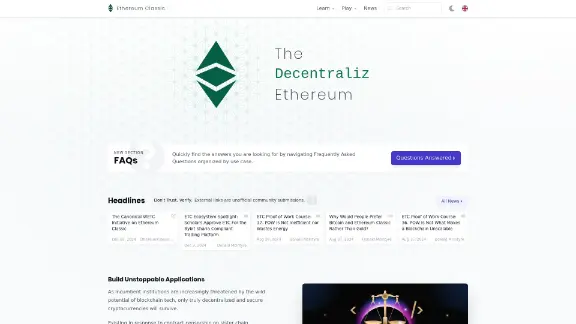Ethereum Classic (ETC)
Ethereum Classic is an open-source, public blockchain platform that supports smart contract functionality. It originated as a hard fork from the original Ethereum blockchain and continues to follow the same consensus protocols. Since its inception, Ethereum Classic has fostered a community of developers committed to enhancing its capabilities. The platform allows users to create and deploy decentralized applications, manage digital assets, and create smart contracts.
History of Ethereum Classic
Origins of Ethereum Classic

| Ticker | ETC |
| Category | Smart Contract Platform |
| Website | http://ethereumclassic.org |
| @ETC_Network | |
| Telegram | ETCnetwork |
| https://www.reddit.com/r/EthereumClassic |
Ethereum Classic emerged from the original Ethereum blockchain, founded by Vitalik Buterin and Gavin Wood. The split occurred when a section of the community decided to maintain the "code is law" principle after a significant event known as The DAO hack. This decision led to the creation of two separate chains: Ethereum and Ethereum Classic.
The DAO
The DAO was an innovative decentralized autonomous organization that functioned as a platform for entrepreneurs to present projects and receive funding. It operated on the Ethereum blockchain through smart contracts and raised over $150 million in a highly successful crowdfunding campaign in April 2016.
The DAO Hack
On June 17, 2016, a vulnerability in The DAO's code allowed a hacker to exploit the system, resulting in the loss of 11.5 million ETH. This incident prompted a debate within the Ethereum community about whether to revert the blockchain to recover the stolen funds. Ultimately, a decision was made to implement a hard fork, leading to the creation of Ethereum Classic, which continued with the original blockchain.
Creation of Ethereum Classic (ETC)
Post-fork, the original blockchain was renamed Ethereum Classic, and it retained the digital currency ETC. This chain preserved the history of Ethereum before the hard fork, while Ethereum continued with the new protocol and ETH as its cryptocurrency.
Tokenomics of Ethereum Classic
Distribution and Mining
Ethereum Classic shares its early token distribution history with Ethereum due to their common origin. The initial distribution involved a public sale managed by the Ethereum Foundation, allocating 80% of the initial supply to buyers and 20% to the Foundation and early contributors. Ethereum Classic employs a Proof-of-Work (PoW) mining algorithm, where miners compete to validate transactions and are rewarded with ETC.
The Fork Distribution
Following the DAO fork, Ethereum and Ethereum Classic emerged as separate entities. ETH holders received equivalent amounts of ETH and ETC. The Ethereum Foundation retained the "Ethereum" name and "ETH" ticker, while the legacy chain was rebranded as "Ethereum Classic" with the ticker "ETC."
ETC Usage
ETC is utilized primarily for paying transaction fees and executing smart contract functions on the Ethereum Classic network. It has a fixed supply cap and is designed to serve as a store of value, rewarding miners for their contributions to the network.
Technology of Ethereum Classic
Technical Structure
Ethereum Classic is an account-based blockchain with both external accounts, controlled by private keys, and contract accounts, managed by smart contract code. These smart contracts facilitate the creation of decentralized applications (dApps) on the platform.
Ethereum Virtual Machine (EVM)
Ethereum Classic uses the Ethereum Virtual Machine (EVM), which is Turing-complete and supports programming in languages like Solidity and Vyper. Transactions on the EVM require computational resources, compensated through "gas" fees. Users can expedite transactions by increasing the gas price, incentivizing miners to prioritize them.
Governance of Ethereum Classic
Ethereum Classic Improvement Proposal (ECIP) Process
The Ethereum Classic community uses the ECIP process to propose changes to the ecosystem. This standardized model allows for community input and review, progressing from draft to acceptance based on consensus. Changes are implemented by client developers at their discretion, without on-chain voting mechanisms.
Security and Updates
Addressing Replay Attacks
Following the DAO fork, replay attacks occurred due to transactions being broadcast on both ETC and ETH networks. An update on January 13, 2017, addressed these issues, effectively separating the two networks.
Social Media Presence
Twitter Account Change
Originally, the Ethereum Classic Twitter account garnered a large following to share updates and news. In October 2022, the account was repurposed to support the Ergo Platform. The community was informed of this change, and a new Ethereum Classic Twitter handle was established to continue community engagement and information sharing.
